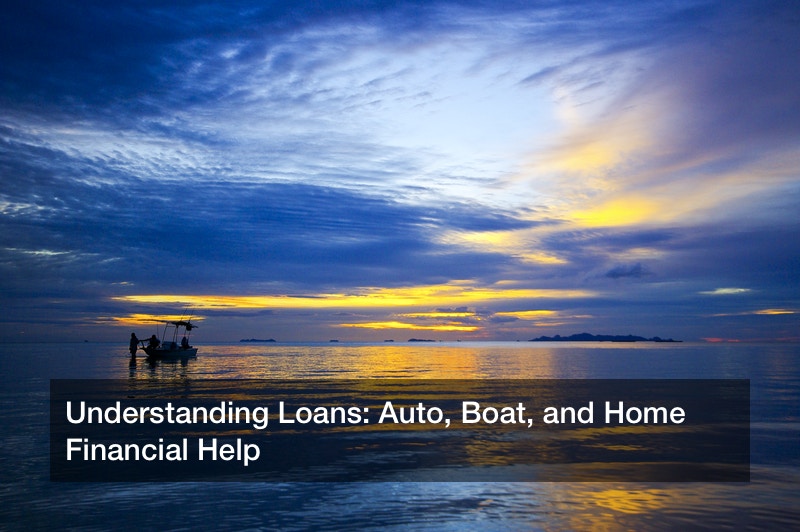
At some point in your life, you may have to make the decision to reach out for financial help in paying for expenses. For example, Americans currently owe over $1.2 trillion in auto loan debts alone. If you’re looking for home, boat, or car loan information, this article will give you the help you need. Here’s everything you need to know for understanding loans.
How Home Loans Work
Financing a home for first-time homebuyers can be overwhelming with the wealth of financing options that are available. The most common loan type is a fixed-rate mortgage, which can be difficult to qualify for. You’ll typically need a high credit score and a large down payment. The Federal Housing Administration has mortgage loan programs that are easier to qualify for and have lower down payments. For either of these loans, you may be required to purchase private mortgage insurance in order to be approved.
Private mortgage insurance is an expense that can be avoided. This insurance protects the lender by transferring a portion of the loan’s risk from them to the mortgage insurer. If you own less than 20% equity in the home, you’ll be expected to have this insurance. You may want to consider consulting an insurance attorney who can review documentation and give you specific advice. The attorney may offer insurance options that will make sure your properly covered for your unique financial situation and spot potential issues that may cause headaches later on.
You may also want to consider an adjustable-rate mortgage. These loans generally offer lower interest rates for a period of time rather than the full length of fixed-rate mortgages. Interest rates remain low for around five to 10 years of the loan. After that period of time, the interest rates will adjust higher or lower once a year, depending on current market rates. These loans can be ideal for homebuyers with poor credit or who may want to move in the future.
Mortgage Payment Calculations
It’s helpful to understand how mortgage payments are calculated by lenders. Home loans are calculated in the same way as you’ll find for car loan information. The amount the lender allows you to borrow is added to the current market interest rate and the total is spread out for a period of 15 or 30 years. Property taxes and homeowners insurance premiums may also be added to the total amount. The amount for these two charges will be placed in an escrow account so the lender can pay these bills when they come due.
To secure a mortgage, you’ll need to have a decent credit history and a low debt-to-income ratio. This ratio should ideally be 36% or lower. If you owe too much, the lender will reject your loan application. You can boost this ratio by paying off debts or getting a second source of income. Plan on having at least 20% of the loan deposit to put as a down payment.
Title Insurance
When you purchase a home, you receive a title document as proof you own the property. However, you may want to consider title insurance to protect you in case anyone else tries to claim ownership. Title insurance protects against claims from unknown liens, omitted heirs, fraud, and public record mistakes. If you take out a mortgage from a lender, this insurance will be required. The rates for this insurance varies depending on the property value, property location, and your insurance provider.
Home Loan Required Documents
Getting a home loan requires submitting plenty of documentation. The type of documentation you’ll need will vary depending on your employment situation. A lender will typically require you to submit copies of your tax returns for the last two years to prove consistent income. You may also be asked to submit pay stubs for the previous month. If you’re self-employed, you may be asked to show proof of direct deposits or copies of 1099 forms.
Lenders may also want to take a look at your bank statements and any other investment assets. They want to see if you have enough in your accounts to cover a few months of mortgage payments. Lenders also want to make sure the down payment amount has been in your bank account for a period of time. Your credit history may also be reviewed as well as your renting history. These documents will prove to the lender that you’re able to make payments on time.
How Auto Loans Work
If you plan to buy a new or used RV or car, you may need financing from an auto insurance agency to help pay for it. It may be beneficial to research car loan information for your local area like you would for an insurance quote to get the best deal. Auto loans can be acquired through banks, credit unions, and auto dealerships. An auto loan typically features a 36 to 72 month loan term with interest. To get a loan, you’ll be required to have comprehensive and collision auto insurance.
Auto Loan Process
When it comes to car loan information, it’s beneficial to understand how the auto loan process works. You may want to consider starting by figuring out how much you can afford to purchase. There are online auto loan calculators online that can help you get an idea of what your loan amount and monthly car payment will be. You may also want to find out what your credit score is before visiting a dealership.
Before agreeing to a purchase price, negotiate as much as possible. Look for a vehicle you can reasonably afford. The cheaper the car is, the less likely the risk will be for you to default on the loan. This can help decrease the amount you’ll be paying every month. If you have a vehicle you can trade-in, this can be used as a down payment to help you save money. Make sure you read all the car loan information documents carefully and understand the terms and conditions before signing.
Car Buying With Bad Credit
In researching car loan information, you may quickly discover that getting a loan with bad credit isn’t easy. There are a few ways you can qualify for a loan even if your credit is less than desirable. You can choose a short term loan, increase your down payment amount, or secure additional financing through a private lender. Leasing a vehicle can be a way to help you restore your credit score and payment history. Monthly lease payments are often less expensive than those from a new vehicle purchase.
Gap Insurance
After doing your research on car loan information and getting the auto loan that works best for you, you may want to consider purchasing gap insurance. This insurance will pay you back the actual cash value of your car if it’s lost or stolen. This payment from your car insurance provider can pay off the remainder of what you owe on your loan. You can research car loan information for gap insurance providers online to get a quote and comparison shop prices.
Personal Loans For Car Financing
When researching car loan information, many people wonder if taking out a personal loan may be better for financing a car. A personal loan is unsecured financing that can be used for a variety of purposes. This financing can be beneficial if you’re buying a car from a private seller or a vehicle that you want to work on as a project in your garage. Personal loan and liability insurance is often less expensive than traditional auto loans that require full insurance coverage.
Because a lender can’t repossess your car with a personal loan like they can with traditional auto financing, you’ll likely be charged a higher interest rate. This loan type also features lower limits and shorter terms. This may make it more difficult to afford the car, depending on your financial situation.
Car Repair Financing
If you have to take your car to an auto body shop for repairs, you may need your car loan information for the repairs. Your insurance will submit checks to both you and the lender if you file an insurance claim. The lender may require documentation from the repair shop before they will endorse the check. You may also be able to receive money to be used for a discount car rental, depending on the damage.
Steps After Paying Off Your Car Loan
Once you’ve paid off your car loan, there are a few actions you’ll need to take to finish the process. You may want to check your credit report as your credit may go down after your final loan payment. Checking your report gives you the opportunity to make sure your car loan information is accurate. There are a few reasons why your credit score was negatively impacted. It could be because your car loan payment was the only installment account or the one with the lowest balance.
After paying off your loan, you’ll also want to get the car title registered in your name as the primary owner. You may also want to look into different car insurance options. Lenders require full coverage, which can be expensive. You may be able to research and get a better rate. Consider saving the amount you paid as a car payment after you’ve paid your car in full. Saving this amount can help you avoid taking out a loan with future purchases, such as a new boat or a house.
How Boat Loans Work
Boat loans work similarly to the way car loans work. If you have an eye on a used boat for sale, there are various types of boat loans you can qualify for. These include credit unions, banks, marine finance companies, and boat dealers. Before applying for a loan, you may want to consider if maintenance, insurance, fuel, and storage costs are affordable for your budget. Boat loans typically come at a fixed amount with interest paid over time.
You can choose a secured or unsecured loan or opt to take out a second mortgage on your home. However, you may need to pay for an appraisal and closing costs, and your home will be used as collateral. Secured loans generally feature a 20-year term and unsecured loans last between five to seven years on average. You may be expected to put a down payment between 10% to 20%, depending on the lender. Interest rates vary from lender to lender.
Boat Loan Process
Just like with home and car loan information, understanding the boat loan process is key to getting the financing you need. Check your credit score first and shop around for the best deal on a new or used boat. Make sure to buy something you can reasonably afford. If you make $40,000 per year, it may not be financially wise to try to buy a boat with a $100,000 price tag. Get several quotes from lenders and compare terms and interest rates.
Boat Loan Alternatives
If you can’t afford to buy a boat, there are some alternatives you may want to consider. You may want to consider creating a savings plan to buy a boat with cash. This can help you save money on interest. It can also give you the ability to negotiate a lower purchase price.
You can also rent a boat through peer-to-peer rentals just like you would rent a home through websites like Airbnb. If you join a boat club, you can get access to boats for a one-time membership fee and ongoing dues paid monthly or annually. Just like with car loan information, you can find resources for these alternatives by researching online.
Whether you’re in need of home, boat, or car loan information, it’s important that you understand what you’re getting into before signing loan papers. By doing your due diligence, you can save yourself time and money and avoid future headaches. Use the information in this article as a starting point toward getting the financial help you need.







